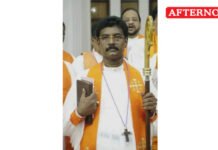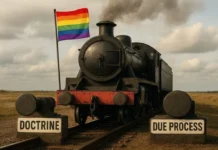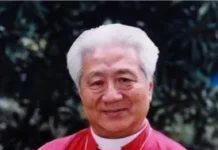The Archbishop of Canterbury, Justin Welby, met with Aboriginal Christian pastors and leaders at St John’s Anglican Church in Sydney last week as part of his 14-day visit to Australia.
Gubbi Gubbi, Gureng Gureng and Ambrym Island lead minister from Scarred Tree Indigenous Ministries, the Rev Ray Minniecon said the visit was about building relationships and putting faces to names of Indigenous leaders in the Anglican Communion.
With traditional mats laid out, guests gathered on the lawn of St John’s in front of a Scarred Tree, showing the markings that a traditional carrying vessel has been cut out of it. It is the last such tree in the inner Sydney metro and business district.
Gubbi Gubbi, Gureng Gureng, Ambryn and Torres Strait Islands emerging leader from Scarred Tree Indigenous Ministries, Larissa Minniecon, began the meeting with a compelling expression of grief and angst for the harm and dislocation that First Nations peoples have experienced, and continue to experience, since the invasion of Australia.
“I have been traumatised by the memories and stories of my people,” she said. “How is our church giving mercy and walking humbly?”
Rev Minniecon spoke on the significance of the Scarred Tree saying, “It represents two things: First Nations people as a deeply wounded people and the Scarred Tree also represents the deep wounds of Jesus on the Cross, through which we are healed.”
“We have a shared responsibility in terms of reconciliation – with God, among nations and between people,” he said. “Reconciliation is one of the most important issues facing humanity.”
First Nations Pastor from Macarthur in south-west Sydney, the Rev Michael Duckett, greeted the Archbishop and his wife Caroline in Gunggari language before displaying boomerangs that he had made. He said that boomerangs have meant survival and nurturing for many First Nations people in Australia. Rev Duckett then presented the Archbishop with a pair of boomerangs formed in the shape of a cross.
The Archbishop presented Rev Minniecon with the Hubert Walter Award for Reconciliation and Interfaith Cooperation for “costly work with Australia’s Stolen Generation and with the Anglican Church”.
The Archbishop said we can’t change history and the terrible things that have been done but we can change the future.
“When we repent as a people, that’s when we can reconcile,” he said. “It takes generations but it can begin,” he said.
“Reconciliation is always the move by the person in the position of strength toward those who have been harmed.”
On the Archbishop’s tour, he and his wife have visited Perth, Melbourne and Sydney and will visit Adelaide and regional centres such as Thursday Island and Yarrabah.



